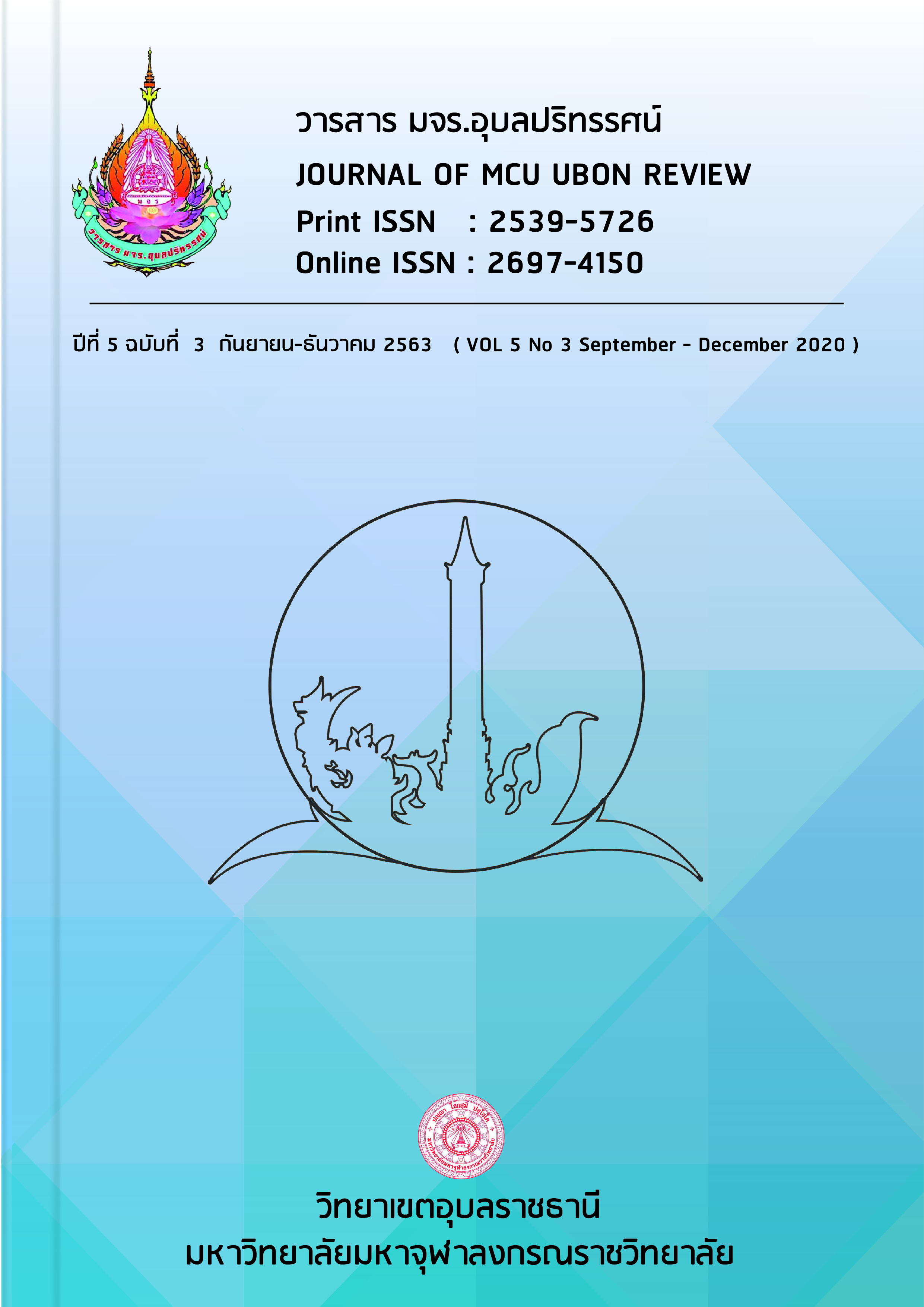ผลของโปรแกรมสร้างเสริมสุขภาพโดยการประยุกต์ใช้แบบแผนความเชื่อด้านสุขภาพร่วมกับแรงสนับสนุนทางสังคม เพื่อควบคุมน้ำหนักของเด็กที่มีน้ำหนักเกินเกณฑ์มาตรฐานในนักเรียน ชั้นประถมศึกษาปีที่ 4-6
Main Article Content
บทคัดย่อ
การวิจัยครั้งนี้ มีวัตถุประสงค์ของการวิจัย คือ เพื่อศึกษาผลของโปรแกรมสร้างเสริมสุขภาพโดยการประยุกต์ใช้แบบแผนความเชื่อด้านสุขภาพร่วมกับแรงสนับสนุนทางสังคมเพื่อควบคุมน้ำหนักของเด็กที่มีน้ำหนักเกินมาตรฐานในนักเรียนชั้นประถมศึกษาปีที่ 4-6 และเพื่อเปรียบเทียบคะแนนความเชื่อด้านสุขภาพ แรงสนับสนุนทางสังคม ความรู้เรื่องโรคอ้วน พฤติกรรมการบริโภคอาหาร พฤติกรรมการออกกำลังกาย น้ำหนักตัว ของเด็กที่มีน้ำหนักเกินมาตรฐานระหว่างกลุ่มทดลองและกลุ่มเปรียบเทียบ ก่อนและหลังการทดลอง กลุ่มตัวอย่างขนาดตัวอย่างรวมทั้งสิ้น 60 คน แบ่งเป็น 2 กลุ่ม คือ กลุ่มทดลอง จำนวน 30 คน และกลุ่มเปรียบเทียบ จำนวน 30 การเก็บรวบรวมข้อมูลโดยใช้แบบวัดแรงสนับสนุนทางสังคม ความรู้ความเชื่อด้านสุขภาพ พฤติกรรมการบริโภคอาหาร และการออกกำลังกายของนักเรียนที่เป็นโรคอ้วนและน้ำหนักเกิน ซึ่งเป็นเครื่องมือเก็บรวบรวมข้อมูลที่มีลักษณะผสมผสานระหว่างแบบตรวจสอบรายการ แบบสอบถาม และแบบทดสอบที่ผ่านการประเมินโดยผู้เชี่ยวชาญ สถิติที่ใช้ในการวิเคราะห์ข้อมูล ได้แก่ ความถี่ ร้อยละ ค่าเฉลี่ย ส่วนเบี่ยงเบนมาตรฐาน สถิติทดสอบที่ใช้ คือ การทดสอบไคสแควร์ การทดสอบที และการทดสอบเอฟ ผลการวิจัย พบว่า 1) ผลการควบคุมน้ำหนักของนักเรียนที่เป็นกลุ่มทดลอง พบว่า ในภาพรวมนักเรียนมีน้ำหนักตัวลดลง 2.44 กิโลกรัม ซึ่งเป็นน้ำหนักตัวที่ลดลงอย่างมีนัยสำคัญทางสถิติที่ระดับ 0.05 เมื่อพิจารณาเป็นรายบุคคล พบว่า นักเรียนมีน้ำหนักตัวที่ลดลงทุกคน โดยมีน้ำหนักตัวที่ลดลงตั้งแต่ 1.3 ถึง 3.8 กิโลกรัม 2) คะแนนที่วัดครั้งหลังด้านความเชื่อด้านสุขภาพ แรงสนับสนุนทางสังคม ความรู้เรื่องโรคอ้วน พฤติกรรมการบริโภคอาหาร พฤติกรรมการออกกำลังกาย ในกลุ่มทดลองสูงกว่ากลุ่มเปรียบเทียบอย่างมีนัยสำคัญทางสถิติที่ระดับ 0.05 น้ำหนักตัวของนักเรียนที่มีน้ำหนักเกินมาตรฐานในกลุ่มทดลองลดลงอย่างมีนัยสำคัญทางสถิติที่ระดับ 0.05 และต่ำกว่ากลุ่มเปรียบเทียบอย่างมีนัยสำคัญทางสถิติที่ระดับ 0.05
Article Details
เอกสารอ้างอิง
แคทรียา แสงศิริพงษ์. (2555). การประยุกต์ใช้แรงสนับสนุนทางสังคมเพื่อส่งเสริมการควบคุมน้ำหนักของเด็กอ้วนในโรงเรียนประถมศึกษา เขตอำเภอเมืองยโสธร จังหวัดยโสธร. บัณฑิตวิทยาลัย : มหาวิทยาลัยมหาสารคาม.
ประวัติ ศรีอ่อน. (2553). การมีส่วนร่วมของผู้ปกครองนักเรียนที่อยู่ในโปรแกรม การควบคุมน้าหนัก โรงเรียนบ้านสันกำแพง จังหวัดเชียงใหม่. บัณฑิตวิทยาลัย : มหาวิทยาลัยเชียงใหม่.
พัสตราภรณ์ แย้มเม่น. (2554). ผลของโปรแกรมการส่งเสริมสุขภาพโดยประยุกต์ใช้แบบแผนความเชื่อด้านสุขภาพร่วมกับแรงสนับสนุนทางสังคม ในการปรับเปลี่ยนพฤติกรรมเพื่อควบคุมน้ำหนักของนักเรียนชั้นประถมศึกษาปีที่ 5 ที่มีน้ำหนักเกินเกณฑ์ อำเภอเมือง จังหวัดพิษณุโลก. บัณฑิตวิทยาลัย : มหาวิทยาลัยขอนแก่น.
โภชนาการ, สำนัก กรมอนามัย กระทรวงสาธารณสุข. (2550). โรคอ้วน. กรุงเทพฯ:ชุมนุมสหกรณ์การเกษตรแห่งประเทศไทย.
_______. กรมอนามัย กระทรวงสาธารณสุข. (2557). แนวทางการควบคุมป้องกันภาวะอ้วนในเด็กนักเรียน.นนทบุรี : สำนักงานกิจการโรงพิมพ์องค์การสงเคราะห์ทหาร
ผ่านศึก.
สาธารณสุขจังหวัดอุบลราชธานี, สำนักงาน. (2554). หลักการรับประทานอาหารที่มีผลดีต่อสุขภาพ. อุบลราชธานี : สำนักงานสาธารณสุขจังหวัดอุบลราชธานี.
สุธิดา กรุดเนียม. (2551). แนวทางการพัฒนาความรู้ ทัศนคติและพฤติกรรมการควบคุมระดับน้ำตาลในเลือดของผู้ป่วยโรคเบาหวานชนิดไม่พึ่งอินซูลิน ที่มารับบริการในสถานีอนามัยตำบลบ้านกุ่ม อำเภอบางบาล จังหวัดพระนครศรีอยุธยา .บัณฑิตวิทยาลัย : มหาวิทยาลัยราชภัฏพระนครศรีอยุธยา.
อัญชนา พวงจิต . (2553). ความสัมพันธ์ของปัจจัยส่วนบุคคลแรงสนับสนุนทางสังคม การรับรู้ประโยชน์การควบคุมการบริโภคอาหารที่มีต่อพฤติกรรมการบริโภคของผู้ป่วยไตวายเรื้อรังที่ฟอกเลือดด้วยเครื่องไตเทียมในจังหวัดสามเหลี่ยมอันดามัน .บัณฑิตวิทยาลัย : มหาวิทยาลัยราชภัฏภูเก็ต.
Becker, M.H. & Maiman , L.A . (1997). The health belief model correlates in psychological theory. New Jersey : Charles B. Slack.
Gable, Sara, Chang, Yiting, and Krull, Jennifer L. (2007). “Television Watching and Frequencyof Family Meals are Predictive of Overweight Onset and Persistence in a National Sample of School-aged Children,” Journal of the American Dietetic Association. 107(1) 53-61.
Rosenstock , Lrwin M. (1974). Historical Origins of the Health Belief Model Health Education Monographs.2(4),355 -385.


